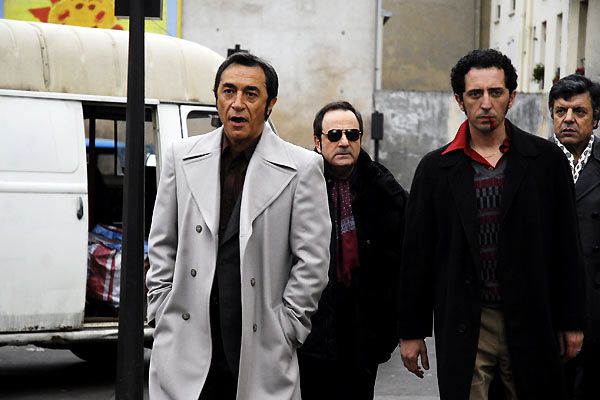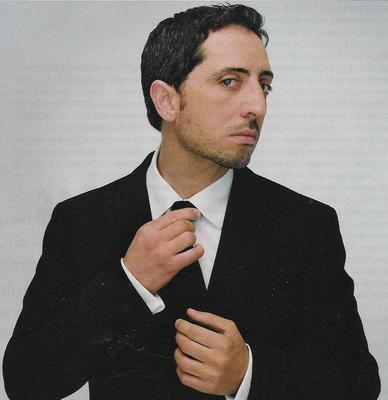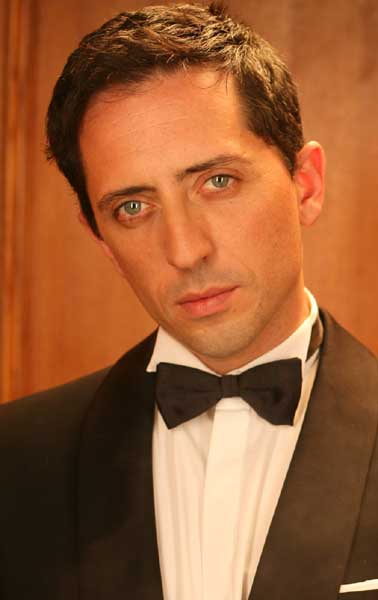Movie Review: 10 Weizman Street plus Comme ton Pere
I don’t think there’s anything more awesome about DC than being able to go to Le French Embassy for a Jewish Film Festival (you can read about the last movie I saw here, and please note that I was compensated with free tickets for the festival, but as always, I don’t endorse anything that’s lame). I did just that last week. Can you tell I was excited by my tweets?
 There, we saw the short film 10 Weizman Street, which turned into the feature, Comme ton Pere (Father’s Footsteps in English.)
There, we saw the short film 10 Weizman Street, which turned into the feature, Comme ton Pere (Father’s Footsteps in English.)
I wish everyone could see both movies. Fortunately, I’ve found 10 Weizman Street on YouTube.
It takes place in 1991, somwhere in Tel Aviv, amongst abandoned back streets. It is the Gulf War and three Soviet immigrants-a father, mother, and daughter and straight from Ben Gurion, lugging their suitcases in hand and Soviet, stiff, mothball-filled clothes looking extremely out of place in the shimmering dry dust of the Holy Land of Florentin. The daughter is weaing a Soviet school uniform. They struggle with all the things that immigrants struggle with when they put on the new uniform of their adoptive homeland. All of a sudden, an air raid siren sounds, signaling that they have 45 seconds to get to a miklat (bomb shelter)-it’s Saddam Hussein and the SCUD missiles, and alien people wearing gas masks run through the street.
The film is only 13 minutes long, but in a way, it sums up the whole of the post-Soviet immigrant experience in Israel-the fear, the frustration, the completely new laws of the West. And, although the episode is surreal, it happened hundreds and thousands of times, in slight variations, for thousands of immigrants in the same way. All in all, a completely subtle, quiet, and extremely powerful film. Here it is:
Part I
Part II
Everything in the short resonated completely with me, especially as a single girl child of Soviet immigrants who went through much the same process over a longer period of time.
And then, there is Comme on Pere. The scene below showcases one of the things I loved most about it-the period outfits.
The next movie, Father’s Footsteps, or Comme ton pere in French, was also a jewel. The showing was prefaced with an introduction by the director, Marco Carmel, who sought to recreate the story of his childhood in France with a father who he originally thought was larger than life. In the movie, Marco as Michel, is the youngest of two sons of Algerian immigrants to Israel who have decided to go to France to experience the world in the early 1970s. He sees his father, played by even hotter than Clive Owen talented thespian and Moroccan-born Jew Gad Elmaleh, as a superhero. Instead, Elmaleh, while well-meaning and extremely concerned about –
-where was I? Oh, yes. Elmaleh’s character, Felix, falls in with the wrong crowd while selling antiques at a market in Paris and-
-em. Elmaleh’s character falls in with a bad crowd and eventually resorts to crime with his partner, an older Jewish gangster from the same town in Algeria as he is, Gabes, leaving his family broken and his youngest son, Michel, devastated and without a solid base.
This movie is about so many things, and all of the actors in it are skilled on so many levels. Not only does Elmaleh carry the movie as a family man and a gever gever, but his wife, played by [I don’t think there’s anything more awesome about DC than being able to go to Le French Embassy for a Jewish Film Festival (you can read about the last movie I saw here, and please note that I was compensated with free tickets for the festival, but as always, I don’t endorse anything that’s lame). I did just that last week. Can you tell I was excited by my tweets?
 There, we saw the short film 10 Weizman Street, which turned into the feature, Comme ton Pere (Father’s Footsteps in English.)
There, we saw the short film 10 Weizman Street, which turned into the feature, Comme ton Pere (Father’s Footsteps in English.)
I wish everyone could see both movies. Fortunately, I’ve found 10 Weizman Street on YouTube.
It takes place in 1991, somwhere in Tel Aviv, amongst abandoned back streets. It is the Gulf War and three Soviet immigrants-a father, mother, and daughter and straight from Ben Gurion, lugging their suitcases in hand and Soviet, stiff, mothball-filled clothes looking extremely out of place in the shimmering dry dust of the Holy Land of Florentin. The daughter is weaing a Soviet school uniform. They struggle with all the things that immigrants struggle with when they put on the new uniform of their adoptive homeland. All of a sudden, an air raid siren sounds, signaling that they have 45 seconds to get to a miklat (bomb shelter)-it’s Saddam Hussein and the SCUD missiles, and alien people wearing gas masks run through the street.
The film is only 13 minutes long, but in a way, it sums up the whole of the post-Soviet immigrant experience in Israel-the fear, the frustration, the completely new laws of the West. And, although the episode is surreal, it happened hundreds and thousands of times, in slight variations, for thousands of immigrants in the same way. All in all, a completely subtle, quiet, and extremely powerful film. Here it is:
Part I
Part II
Everything in the short resonated completely with me, especially as a single girl child of Soviet immigrants who went through much the same process over a longer period of time.
And then, there is Comme on Pere. The scene below showcases one of the things I loved most about it-the period outfits.
The next movie, Father’s Footsteps, or Comme ton pere in French, was also a jewel. The showing was prefaced with an introduction by the director, Marco Carmel, who sought to recreate the story of his childhood in France with a father who he originally thought was larger than life. In the movie, Marco as Michel, is the youngest of two sons of Algerian immigrants to Israel who have decided to go to France to experience the world in the early 1970s. He sees his father, played by even hotter than Clive Owen talented thespian and Moroccan-born Jew Gad Elmaleh, as a superhero. Instead, Elmaleh, while well-meaning and extremely concerned about –
-where was I? Oh, yes. Elmaleh’s character, Felix, falls in with the wrong crowd while selling antiques at a market in Paris and-
-em. Elmaleh’s character falls in with a bad crowd and eventually resorts to crime with his partner, an older Jewish gangster from the same town in Algeria as he is, Gabes, leaving his family broken and his youngest son, Michel, devastated and without a solid base.
This movie is about so many things, and all of the actors in it are skilled on so many levels. Not only does Elmaleh carry the movie as a family man and a gever gever, but his wife, played by](http://en.wikipedia.org/wiki/Yael_Abecassis) (who also did an excellent job in Lech, Lechi in 2006), also has excellent on-screen presence that is subtle but just right as she struggles to raise two teenage boys and rise above the circumstances. The relationship between Elmaleh and Abecassis is most touching because, although it is flawed in many ways by Felix’s schemes, it is a relationship between husbands and wives that you don’t see too much anymore-one built on clearly-defined roles but also admiration, and, most evident, class. In the background are the beginnings of the Arab-Israeli conflict as it is currently playing out in France and the Yom Kippur War, all shot in a backdrop of brilliant 70s clothes and hairdos and a combination of Sephardi North African culture that is so foreign to me as an Ashkenazi and that I found fascinating.
The movie is essentially wrapped up as a jewel with an amazing, and ultimately warming plotline, yet one that doesn’t feel saccharine at all, and also at the same time gives us a peek at how people lived in Paris in the 1970s. With this movie, you can really tell that the director was trying to write down his story for absolution so he could move on to other projects. I loved it. Both of them are 100% worth your time.


